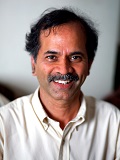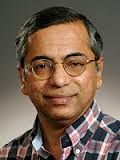.
Keynote speakers

Rama Chellappa
Recent Advances in Differential Geometric Methods for Human Action Recognition
- Minta Martin Professor of Engineering Chair, Department of Electrical and Computer Engineering University of Maryland, College Park.
Pr. Rama Chellappa received the B.E. (Hons.) degree from the University of Madras, Madras, India, in 1975, the M.E. (Distinction) degree from the Indian Institute of Science, Bangalore, India, in 1977, and the M.S.E.E. and Ph.D. degrees in electrical engineering from Purdue University, West Lafayette, IN, in 1978 and 1981, respectively. Since 1991, he has been a Professor of Electrical Engineering and an affiliate Professor of Computer Science with the University of Maryland, College Park. - He is also affiliated with the Center for Automation Research (Director) and the Institute for Advanced Computer Studies (Permanent Member). In 2005, he was named a Minta Martin Professor of Engineering. Prior to joining the University of Maryland, he was an Assistant (1981–1986) and Associate Professor (1986–1991) and Director of the Signal and Image Processing Institute (1988–1990) with the University of Southern California, Los Angeles. Over the last 30 years, he has published numerous book chapters, peer-reviewed journal and conference papers. He has coauthored and coedited books on MRFs, face and gait recognition and collected works on image processing and analysis. He has served as a Co-Editor-in-Chief of Graphical Models and Image Processing. His current research interests are face and gait analysis, markerless motion capture, 3-D modeling from video, image and video-based recognition and exploitation, compressive sensing, and hyper spectral processing. Prof. Chellappa has received several awards, including a National Science Foundation Presidential Young Investigator Award, four IBM Faculty Development Awards, an Excellence in Teaching Award from the School of Engineering at USC, and two paper awards from the International Association of Pattern Recognition. He received the Society, Technical Achievement and Meritorious Service Awards from the IEEE Signal Processing Society. He also received the Technical Achievement and Meritorious Service Awards from the IEEE Computer Society. At the University of Maryland, he was elected as a Distinguished Faculty Research Fellow, as a Distinguished Scholar-Teacher, received the Outstanding Faculty Research Award and the Poole and Kent Teaching Award for the Senior Faculty from the College of Engineering, an Outstanding Innovator Award from the Office of Technology Commercialization and an Outstanding GEMSTONE Mentor Award. In 2010, he was recognized as an Outstanding ECE by Purdue University. He is a Fellow of the IEEE, the International Association for Pattern Recognition and the Optical Society of America. He has served as an associate editor for four IEEE publications and as the Editor-in-Chief of the IEEE TRANSACTIONS ON PATTERN ANALYSIS AND MACHINE INTELLIGENCE. He served as a member of the IEEE Signal Processing Society Board of Governors and as its Vice President of Awards and Membership. He has served as a General and Technical Program Chair for several IEEE international and national conferences and workshops. He is a Golden Core Member of the IEEE Computer Society and served a two-year term as a Distinguished Lecturer of the IEEE Signal Processing Society. Recently, he completed a two-year term as the President of IEEE Biometrics Council.

Baba Vemuri
Efficient Algorithms for Statistical Analysis of Manifold-valued Data with Applications to Computer Vision and Medical Imaging
- PUF Research Foundation Professor, Dept. of Computer and Information Science and Engineering
Director, Center for Vision Graphics and Medical Imaging).
Pr. Baba C. Vemuri received the PhD in Electrical and Computer Engineering from the University of Texas at Austin in 1987. He then joined the Department of Computer and Information Sciences at the University of Florida, Gainesville, and is currently a full professor of computer and information sciences and engineering. He also holds affiliate appointments in the Department of ECE and BME at the University of Florida. - He served as a program chair for several conferences including the 11th IEEE International Conference on Computer Vision (ICCV 2007). He has been an area chair and a program committee member of several IEEE conferences. He was an associate editor for several journals, including the IEEE Transactions on Pattern Analysis and Machine Intelligence --TPAMI, (from 1992 to 1996), the IEEE Transactions on Medical Imaging -- TMI, (from 1997 to 2003) and the journal of Computer Vision and Image Understanding (from 2000-2010). He is currently an associate editor for the Journal of Medical Image Analysis (MedIA) and the Intl. Journal of Computer Vision (IJCV). His research interests include Medical Image Computing, Computer Vision, Machine Learning, Information Geometry and Applied Mathematics. For the last several years, his research work has primarily focused on Information Geometric methods. Along this theme, he has been developing algorithms for the recursive computation of the statistics on Riemannian manifolds pertinent to manifold-valued data sets, analysis of diffusion weighted MRI and diffusion tensor MRI, 3D image segmentation, unimodal and multimodal image (rigid+nonrigid) registration, nonrigid registration of 3D point sets, metric learning, and large margin classifiers. He has published more than 180 refereed journal articles and conference proceedings on Medical Image Computing, Computer Vision, Graphics, and Applied Mathematics. He received the US National Science Foundation Research Initiation Award (NSF RIA) in 1988 and the Whitaker Foundation Award in 1994. He has received several best paper awards at various International Conferences and is a fellow of the IEEE and ACM.




